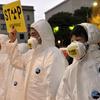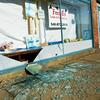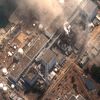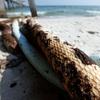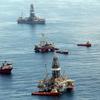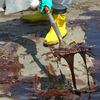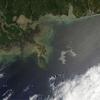David Biello appears in the following:
President Obama To Meet With China On Climate Change
Friday, September 02, 2016
Picking a Path on Climate Change: Draft Deal Emerges From COP21
Thursday, December 10, 2015
One Success Story in Saving the Planet
Friday, September 12, 2014
In The Future, We'll All Be Wearing Short Sleeves To Business Meetings
Tuesday, July 22, 2014
Our daily lives might be about to change with the expected climate shift. David Biello, editor for environment and energy at Scientific American, discusses the future of our communities, and some of the changes Americans might have to make.
The Future of Nuclear Energy One Year After the Fukushima Meltdown
Friday, March 09, 2012
One year ago this Sunday a massive earthquake devastated northeast Japan. The Japanese barely had time to catch their breath before waves of water 30 feet high crashed down on the coast. Twenty-thousand people died; 90,000 were evacuated. The natural disasters were soon followed by a nuclear crisis. In the year since the meltdown at the Fukushima Daiichi plant, Japan has had to face difficult questions on the state of their nuclear regulations and the country’s energy future.
Obama Withdraws from Stricter Smog Standards
Monday, September 05, 2011
Last Friday, President Obama withdrew a new draft of the Ozone National Ambient Air Quality Standards. This means smog standards will not be updated but instead will remain at the same level since 2008 — levels that George W. Bush’s science advisers declared inadequate. Current EPA administrator Lisa Jackson declared this decision "not legally defensible." Obama cited regulatory uncertainty and burden as the reasons for his decision.
Earthquake Rattles East Coast, As Hurricane Heads for U.S.
Wednesday, August 24, 2011
A very rare event happened In the northeastern part of the United States yesterday. A 5.8 magnitude earthquake centered in Mineral, Virginia sent tremors outward, all the way north to New York and New England, and south to North Carolina. Limited damage was reported and some even found the event to be exciting. The earthquake follows a number of natural disasters we have witnessed this year, including Japan's massive quake and tsunami, tornadoes ravaging southern states and the Mississippi River rising to historic levels, flooding cities in its path. And now Hurricane Irene, which experts predict could turn into a category 4 storm, and may hit Florida on Friday.
Japan's Road to a Cold Shut Down of Fukushima
Thursday, July 21, 2011
It’s been over four months since the earthquake and tsunami devastated Japan and crippled the Fukushima Daiichi Nuclear Power Station, which led to partial nuclear meltdowns in three of its reactors. Japan's government now says that those reactors are stable, and are headed toward a cold shutdown.
Obama Administration Releases 30 Million Barrels of Oil from US Reserve
Thursday, June 23, 2011
The Obama administration is is releasing 30 million barrels of oil from the U.S. Strategic Petroluem Reserve as part of a broader international effort to increase the amount of oil—to 60 million barrels—into the world market over the next month, in the hopes of replacing some of the oil production lost due to the conflict in Libya and reducing energy prices for businesses and consumers.
One Year Later: Looking at the Impact of the BP Oil Disaster in the Gulf
Wednesday, April 20, 2011
It's been a year since the Deepwater Horizon explosion and oil spill and many questions remain about the long-term impact that the disaster will have not just on public policy, but on the fragile ecosystems of the Gulf Coast. To mark the one year anniversary of the disaster, two of our regular contributors reflect on what the future looks like one year later. Lisa Margonelli is the Director of the Energy Policy Initiative at the New America Foundation and David Biello is an editor at Scientific American.
Health Risks of Producing Energy
Monday, March 28, 2011
David Biello, associate editor of Scientific American, talks about the health risks associated with oil, coal, nuclear, natural gas and other sources of energy.
→ Listen, Read a Recap, and Join the Conversation at It's a Free Country
Answering Your Questions on Nuclear Crisis
Friday, March 18, 2011
Yesterday we asked listeners: What do you want to know about the ongoing crisis in Japan? You gave us plenty to work with, and now we're going to have some of your best questions answered by our expert guest, David Biello, associate editor of environment and energy for Scientific American.
Fukushima Power Plant: 'How Serious is This?'
Thursday, March 17, 2011
There are four different sources of leaking radiation from the damaged nuclear reactors at the Fukashima Diaiichi complex in Japan. The Japanese government, the Tokyo electric Power company and foreign governments monitoring the situation as well as international nuclear agencies seem to have conflicting information on the level of danger and the appropriate response. Takeaway listeners have concerns as well. David Biello, associate editor of environment and energy for Scientific American magazine, answers your questions.
Fukushima and the Fallout
Thursday, March 17, 2011
The situation at the Fukushima Power Plant in Japan continues to worsen. U.S. Media is reporting that water levels are dropping in more than one of the six reactors at the plant, leaving nuclear fuel rods exposed. The United States Nuclear Regulatory Commission has warned that Japanese regulators may be downplaying the risk of radiation levels at the plant; and the commission has advised that Americans evacuate the area within 30 miles of Fukushima.
Energy Experts Skeptical of Cancún Climate Talks
Tuesday, December 07, 2010
The U.N.’s climate talks in Cancún moved into their second week on Monday. The agenda is dominated by future cuts in carbon emissions and keeping countries honest about their actions to control global warming. Expectations, however, remain low following last year’s talks in Copenhagen, which resulted in no binding agreement to manage the world's carbon emissions.
What Have We Learned from the BP Oil Spill?
Tuesday, August 03, 2010
Since the Deepwater Horizon explosion in April, 205.8 million gallons of oil have gushed into the Gulf of Mexico, according to the latest estimates by federal scientists. (Imagine a cube filled with oil, where each side is as long as an American football field.) In the months since the explosion, BP has made more than a dozen attempts to stop the flow of oil. Last night BP started a "static kill," a procedure that could permanently seal the well.
What have scientists learned from this spill? Can we prevent this from happening again?
Experts Answer Your Questions About Oil Spill
Friday, May 28, 2010
As we learn more about the BP oil leak, there's more that doesn't make sense. It's been almost six weeks since the explosion, which caused the disastrous gusher in the Gulf of Mexico, and many of the public's questions are still unanswered.
Oil Spill: Answers to Your Questions
Thursday, May 27, 2010


We asked our listeners for questions about the oil disaster in the Gulf of Mexico, and then had two of our favorite energy experts answer them. Lisa Margonelli is director of the New America Foundation Energy Policy Initiative and writes about global energy issues; David Biello is an associate editor on Energy & the Environment at Scientific American.
Feds May Take Over Oil Cleanup Efforts from BP
Tuesday, May 25, 2010
Oil has now been gushing into the Gulf of Mexico for 36 days. BP has taken full responsibility for plugging the leak and cleaning up the water and shores, but some are now saying that after a month of attempts, their time at bat is up, and the federal government should take over operations. According to the Oil Pollution Act of 1990, the government can federalize the spill and run the cleanup operation, billing BP for the total cost. However, this remedy is meant to be used as a last resort.
The Science and Technology Behind Cleaning Up an Oil Spill
Thursday, April 29, 2010
Last week’s oil rig explosion in the Gulf of Mexico has resulted not only in lost lives, but in a steady flow of leaking crude oil that could threaten coastal areas, wild life, and marine life. The well head continues to leak about 42,000 gallons of oil per day, or roughly the volume of seven tanker trucks. The slick has spread out over the water and still threatens to drift into Louisiana's marshland. We look at the technologies being enlisted to combat this enormous oil slick.




